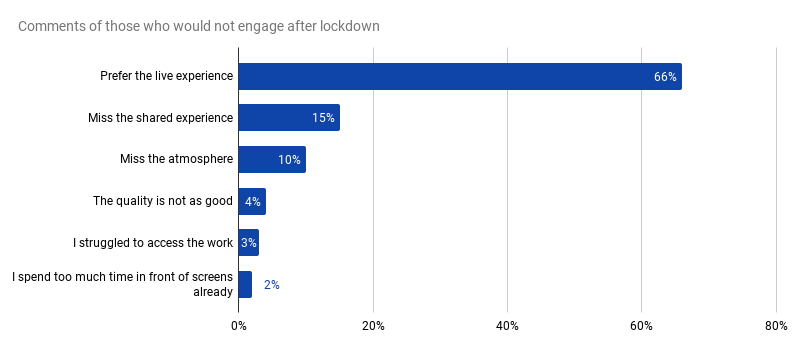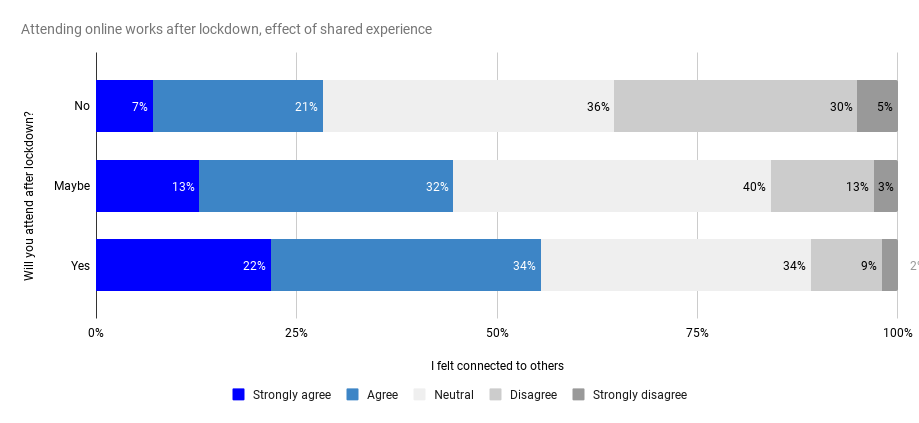Introduction
Last year we created an Online Works evaluation template and made it available to Impact & Insight Toolkit (Toolkit) users. This template was designed by Counting What Counts (CWC), in cooperation with Arts Council (ACE) and industry peers, in order to support organisations which have shifted to offering their works online during the pandemic.
The template was designed to capture data on a wide range of things including the quality of the online delivery, the willingness to pay for online events, and the likelihood to re-engage with online events in the future.
Since then, many organisations have made use of the template to evaluate their work. For those that have used it – we hope that it’s been a helpful tool!
An added benefit of using a shared template is that we can group the data together and look for insights in the aggregated data. We have carried out a piece of analysis and now (whilst maintaining anonymity!) we would like to share some of the key findings of this analysis with you in a series of blogposts.
Analysis summary
The analysis focussed primarily on the likelihood for audiences to engage with online works again in the future, after lockdown restrictions have ended, and the things that affect that. There were three key findings resulting from the analysis. These are:
- The feeling of a shared experience is a crucial component
- Many people have difficulty accessing works online
- People with no prior experience of an organisation’s work are more likely to attend online works again than those with prior in-person experience
This blogpost will focus on the first of these findings.
The importance of a shared experience
The specific factor which was reported by online audiences as having the biggest effect on their likelihood to attend online works again after lockdown was the feeling of a shared experience.
What does the data showing this look like, and how do we arrive at this conclusion?
Firstly, we asked those who said they would not attend again to offer reasons why. Of those that answered, 15% gave the lack of shared experience as the reason why they would not attend again. This is significantly more than those who gave quality issues as the reason – only 4%.

n=272
It is worth noting that the above data stems from comments where respondents can write whatever they like. The words “shared experience” were chosen by the respondents themselves without being prompted. This carries more weight than had it been offered as a multiple-choice option.
We also asked all respondents both of these questions:
- Would they attend online works again after lockdown?
- Did they feel connected to others?
Looking at the combined results from these questions we see:
- Of those who said Yes to future attendance
○ 56% agreed or strongly agreed that they feltconnected to others
○ 11% disagreed or strongly disagreed that they felt connected to others
- Of those who said No to future attendance
○ 28% agreed or strongly agreed that they felt connected to others
○ 35% disagreed or strongly disagreed that they felt connected to others

n: No=201, Maybe=1551, Yes=2728
The savvy readers will note that correlation does not imply causation, and there could be a shared factor which creates the effect we are seeing. This is true! However, there are a couple of additional reasons why these findings are worth applying for the development of online events.
These two data points together present some clear evidence that the feeling of a shared experience is important to people, and a lack of this has a discouraging effect on people choosing to seek out online works again in the future.
If we consider other data points external to the Toolkit and the cultural sector we can find examples where efforts are being made to bring a shared experience to online works. Several major video streaming services providers including Disney+, Amazon and Netflix are integrating a shared experience into their offers. BT Sport is also offering a new service allowing their customers to watch sporting events together using their Watch Together service. This supports the finding that a feeling of shared experience is important for online audiences.
Finally, the way we recommend using this finding is not ‘drop everything and focus on the shared experience’, but instead to bring the potential importance of this to attention so that, where decisions are being made which might influence it, they can be made in the direction in support of a shared experience.
We look forward to bringing you more helpful findings, all based on your usage of the Evaluation for Online Works Template!
Image credit: Photo by Hans Vivek on Unsplash